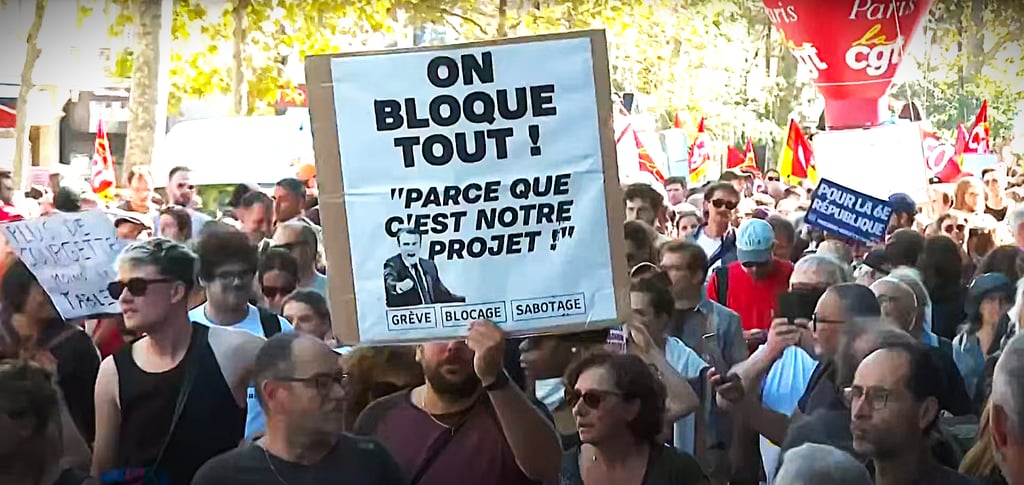French Unions Stage Massive Strike Against Austerity, Mount Pressure on Macron
Millions join a nationwide strike in France on Sept 18, 2025, opposing austerity cuts and pension reforms, increasing pressure on President Macron’s government.
Raja Awais Ali
9/18/20252 min read


French Unions Strike Against Austerity, Putting Macron Under Heavy Pressure
On 18 September 2025, France witnessed one of its largest national strikes in years as powerful labor unions united against President Emmanuel Macron’s austerity program. Around 800,000 workers and citizens marched across the country to protest sweeping budget cuts, higher retirement ages, and reductions in public services.
The strike brought together teachers, transport workers, healthcare staff, pharmacists, and a wide range of public-sector employees. Train and metro services were severely disrupted, many schools remained closed, and hospitals operated with limited staff. Even pharmacies in several regions kept their doors shut, signaling broad participation beyond traditional union strongholds.
At the heart of the unrest is the government’s plan to curb a budget deficit of about 5.8 percent of GDP, nearly double the European Union’s recommended 3 percent ceiling. France’s national debt has also climbed to over 114 percent of GDP, prompting Macron’s administration and newly appointed Prime Minister Sébastien Lecornu to propose a €44 billion savings package. Key measures include raising the pension eligibility age, cutting certain public holidays, and tightening unemployment benefits.
Union leaders argue these steps unfairly burden the middle and working classes while leaving the wealthy largely untouched. They describe the program as “socially unjust,” warning that ordinary families will shoulder the cost of fiscal discipline while corporations and high-income earners escape higher taxation.
The strike affected nearly every corner of the country. In Paris and other major cities, demonstrators blocked major roads and gathered in large rallies. Authorities deployed around 80,000 police officers to maintain order, but most protests remained peaceful despite scattered clashes and traffic disruptions.
In response to the mounting pressure, the government has already withdrawn a proposal to cut two public holidays, yet it continues to defend other austerity measures as essential for stabilizing public finances and meeting EU fiscal rules. Officials insist that without reforms France risks losing investor confidence and facing higher borrowing costs.
Politically, the strike poses a significant test for Macron’s second term. His approval ratings have been sliding since the announcement of the budget plan, and opposition parties are seizing the moment to rally support. Analysts warn that if the administration fails to reach a compromise, France could see prolonged industrial action and a legislative deadlock that hampers future economic policy.
For now, union leaders promise further demonstrations if their demands for fair taxation and protection of social benefits are not met. Economists note that prolonged unrest could slow economic growth, but they also highlight that public pressure has historically forced French governments to soften austerity measures.
The 18 September strike underscores a pivotal moment for France: a clash between fiscal responsibility and social equity. Whether Macron adjusts course or doubles down on austerity will shape the country’s political and economic landscape for years to come.
Stay informed with the latest national and international news.
© 2025. All rights reserved.